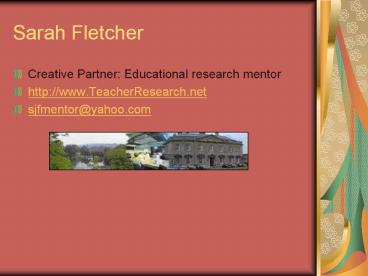Sarah Fletcher - PowerPoint PPT Presentation
1 / 15
Title:
Sarah Fletcher
Description:
should unblock the ways to change by building self-confidence, self-esteem and a ... How can we develop school websites to show and share our creativity-in-teaching? ... – PowerPoint PPT presentation
Number of Views:80
Avg rating:3.0/5.0
Title: Sarah Fletcher
1
Sarah Fletcher
- Creative Partner Educational research mentor
- http//www.TeacherResearch.net
- sjfmentor_at_yahoo.com
2
What is Action Research?
- any systematic enquiry conducted by teacher
researchers to gather information about how their
particular schools operate, how they teach and
how well their students learn. Action research is
done by teachers for themselves it is not
imposed on them by someone else - Mills, G. (2003) Action Research a Guide for
the Teacher Educator, USA, New Jersey, Pearson
Education
3
What is action research?How do I identify my
focus or research question? How do I carry
out an audit as a starting point? How do I map
out possibilities for taking action?How do I
collect data in rigorous, systematic ways?How
do I make sure I am on track with my project and
sharing ideas as I make appropriate headway?How
do I provide evidence for any claims that my
creative project is helping students and my
school?
4
Action Research
- What matters most to me as a creative teacher?
- How do I teach best and how can I teach even
better? - In my work as an teacher, what is my main
concern? - How can I live out my professional values more
fully? - What can I do to become a more professional
teacher by helping my colleagues to learn with me
and to teach me? - How can I help our students to learn creatively
in lessons?
5
Action Research
- What is a good focus for a research project?
- (relevant, realistic and rigorously
researched) - What is a good research question? Spot the
difference .. - How can students be more motivated and creative
in lessons? - How can we work with year 9 to develop motivation
and raise - attainment in English lessons based on our Scheme
of Work? - How can I evaluate and then improve teaching and
learning? - How can I publicly evidence and disseminate our
claims to have improved students learning by
developing creativity?
6
You dont have to start with a problem! Start
from enjoyment!
- Why do you want to develop creativity?
- What exactly do you hope to achieve?
- Which students do you want to work with
creatively and what is your joint project? - How do you know when students are being creative?
What does it feel and look like?
7
Teachers Action Research
- How will you teach more creatively?
- How do you show you are creative in your project
and how will others? - How will you demonstrate that your creative
project is worth all the time, energy and money
invested in it?
8
Research Mentoring is
- concerned with continuing personal as well as
professional development (CPPD) and not just
continuing professional development. - Fletcher, S. (2000) Mentoring in Schools A
Handbook of Good Practice London, Taylor and
Francis
9
Research Mentoring
- . should unblock the ways to change by building
self-confidence, self-esteem and a readiness to
act as well as to engage in ongoing constructive
interpersonal relationship. - (Fletcher, 2000)
10
How do teachers destroy CPs creativity when they
work with students in a class?
- You are the creative one. Tell me what to do!
- I am not very creative nor is my class.
- Could you do something creative with my students?
They seem bored in my lesson - Ill give you space to get going - Ill be in the
staffroom if you need me. Im bit busy today. - Shall we just say it went Fine if we have to
report on our CP project? Do we tick box 5?
11
How can teachers help enrich students creativity
by sharing action research?
- How do students explain and share their creative
knowledge in school? - How do students share what they know with other
students and other schools? - How do students explain what they know to improve
Creative Partnerships regional and national
work?
12
Why integrate mentoring in action research?
- Action research is formulaic when you restrict
personal and professional interrelationships. - Mentoring helps students, teachers and partners
develop creative relationships with one
another. - Action research can sometimes be a solitary
experience but mentoring builds supportive
networks for building collaborative creativity. - Mentoring students and teachers skills, values,
knowledge and understandings develop. These are
the core areas for creative engagement.
13
How can we develop creativity with action
research and mentoring ?
- at the Input stage? (idea, language, environment,
resources, qualities, values) - at the Doing stage? (identifying problems,
divergent thinking, fascination, risk-taking,
skills challenges, refinement?) - at the Showing stage? (solving problems, new
ideas, capacity to learn, confidence, new skills,
valued outcomes - at the Reflection stage? (an on-going process
before, during and after a project)
14
Promoting and Sustaining Creativity with Action
Research and technology
- How can we develop critical and structured
thinking to assist our creativity-as-learning? - (Critical Thinking Scaffolds, Coombs, 2000)
- How can we develop school websites to show and
share our creativity-in-teaching? - (http//www.cfkeep.org http//www.TeacherRese
arch.net ) - How can we develop Creative Partnerships
web-based networks to disseminate
creativity-learning and learning-creativity?
15
Sarah Fletcher
- http//www.TeacherResearch.net































